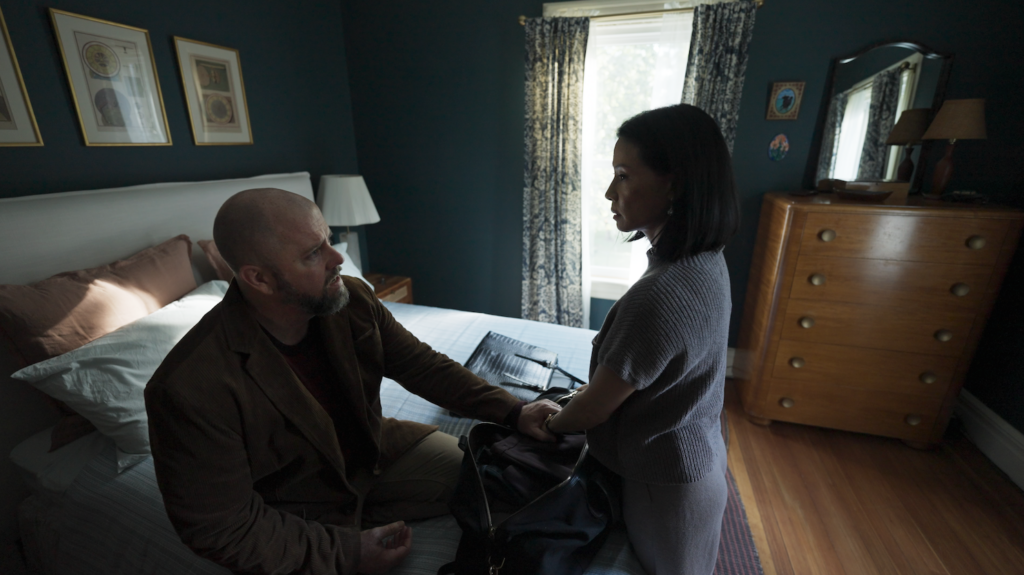Director Steven Soderbergh and Screenwriter David Koepp Team Up for a Second Film, ‘Presence,’ a Notable Addition to the Haunted House Canon
Campfire tales of spectres, spirits, and spooks have been with us since Day One. Certainly, they’ve proved good fodder for the cinema.

If “write what you know” is the hoariest bit of advice doled out to aspiring storytellers, then confirmed storytellers like director Steven Soderbergh and screenwriter David Koepp have gone ahead and proved its utility. In an interview that accompanies the release of “Presence,” the second film on which the two men have collaborated, Mr. Soderbergh relates a story about his Los Angeles home and the rumor that it had once been the site of a matricide.
These things have repercussions: Lights sometimes flicker and the sundry house-sitter has reported a woman shimmering about the premises. “Why,” Mr. Soderbergh wonders, “doesn’t this stuff happen to me? This sounds super exciting.” That the director’s mother was a parapsychologist is a fitting gloss on his otherworldly reverie.
Mr. Koepp isn’t to be bested in spooky anecdotes. He relates how time spent living in the stately pre-war building at Central Park West and 74th Street, the Langham, meant sharing precious Manhattan real estate with some-or-other entity. Mr. Koepp’s teenage son also had an experience with the wraith, to which our erstwhile parent responded, “I was like, no way.”
Regardless of whether one believes in hocus-pocus, one thing is true: There ain’t nothing like a good ghost story. Suspension of disbelief is among the great pleasures prompted by fiction, and the associative capacities of metaphor shouldn’t be underestimated. Campfire tales of spectres, spirits, and spooks have been with us since Day One. Certainly, they’ve proved good fodder for the cinema.

What’s your favorite haunted house picture? Jack Clayton’s “The Innocents” (1961) and Robert Wise’s “The Haunting” (1963) are tops in the genre, though I would also include John Hough’s “The Legend of Hell House” (1973), a pulpy variant on the Shirley Jackson novel, “The Haunting of Hill House.” Babak Anvari’s “Under the Shadow” (2016) is worth seeking out and David Lowery’s “A Ghost Story” (2017) has, in retrospect, earned its keep in sorrow if not in scares.
All of which is a roundabout way of stating that “Presence” is … well, it’s okay. How could the picture not be? Messrs. Soderbergh and Koepp are deeply conversant with their respective crafts and possess impressive notches in their belts. Mr. Koepp had a hand in shaping franchises like “Spiderman,” “Mission Impossible,” and “Jack Ryan.” Mr. Soderbergh has the distinction of losing the Academy Award for Best Director on “Erin Brokovich” to himself for “Traffic” (both 1999). That, and he gave us the terrific George Clooney-Jennifer Lopez vehicle “Out of Sight” (1998).
Mr. Soderbergh is a consummate cinematic tinkerer in “Presence.” The story of an upper middle-class family contending with a recent tragedy, a new home, and bumps-in-the-night is viewed from the vantage point of the title phenomenon. Working with director of photography Peter Andrews, Mr. Soderbergh utilizes a remarkably elastic hand-held camera to both traverse the environs of a single home and establish a narrative point of view. As an exercise in style, this approach is initially disorienting and potentially off-putting, but once the characters settle in and the story hobbles on by, “Presence” proves to be uniformly engaging.
The setting is limited and the cast small, and all are utilized capably. Rebekah (Lucy Liu) is a professional woman given to dubious business transactions; what husband Chris (Chris Sullivan) does for an income is unknown, but he seems well connected, if worried about his marriage. Their teenage son Tyler (Eddie Maday) is cocky; younger daughter Chloe (Callina Liang) is troubled. The latter is peculiarly cognizant that the new home is … different. In short, a dysfunctional family meets a dysfunctional house.
Mr. Soderbergh’s decision to utilize a ghostly point-of-view is limiting in that we are kept farther afield from the living characters than seems altogether wise, particularly as to the nature of their complications and duplicities: I mean, what is up with Rebekah and her ceaseless deleting of emails? Still, Mr. Sullivan is winning as a put-upon dad and the proceedings are memorably punctuated by Natalie Woolams-Torres and Lucas Papaelias as the local psychic and her enabling husband.
“Presence” isn’t the game-changer its adherents are making it out to be, but as an exercise in the preternatural it’s not at all a bad addition to a venerable canon.

